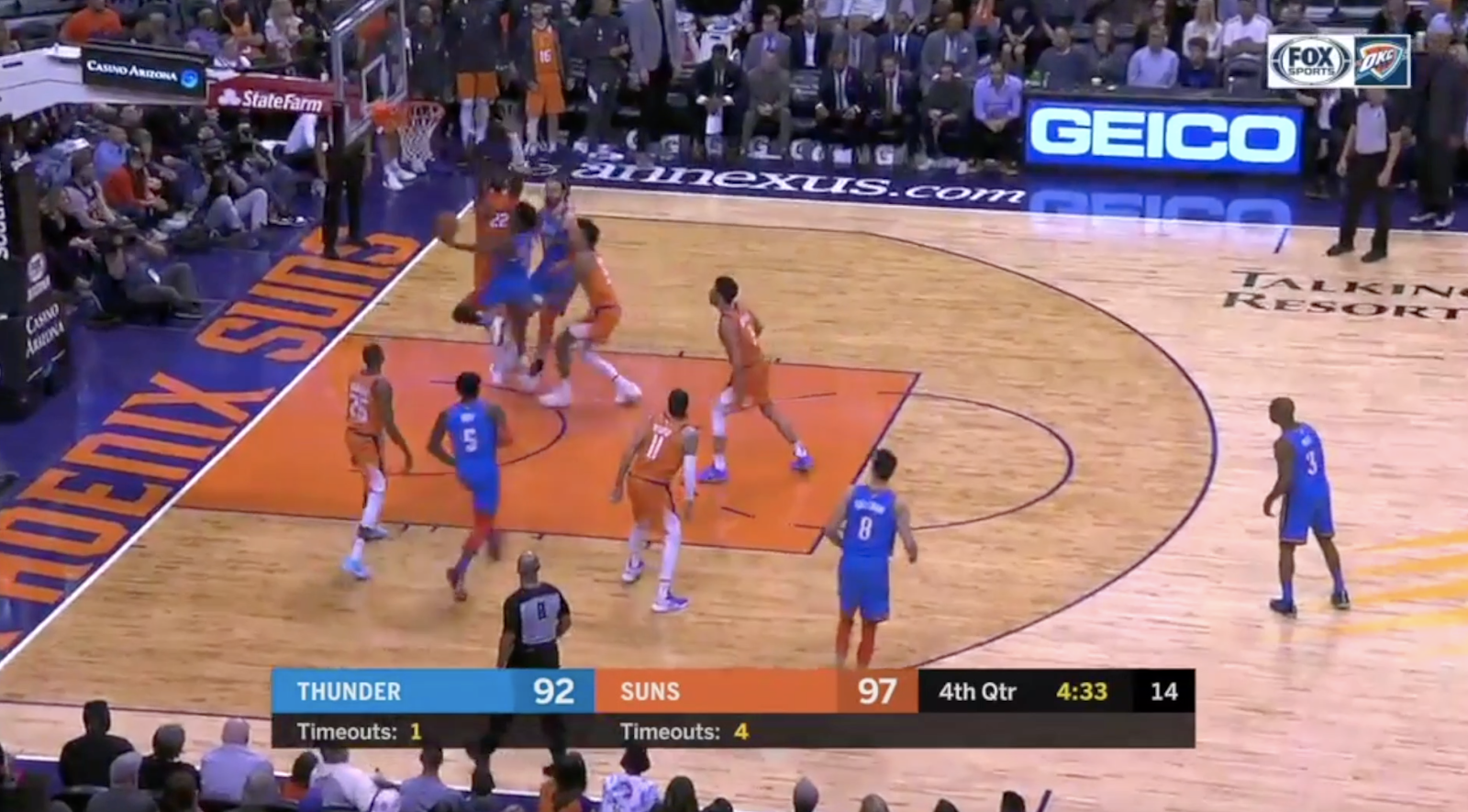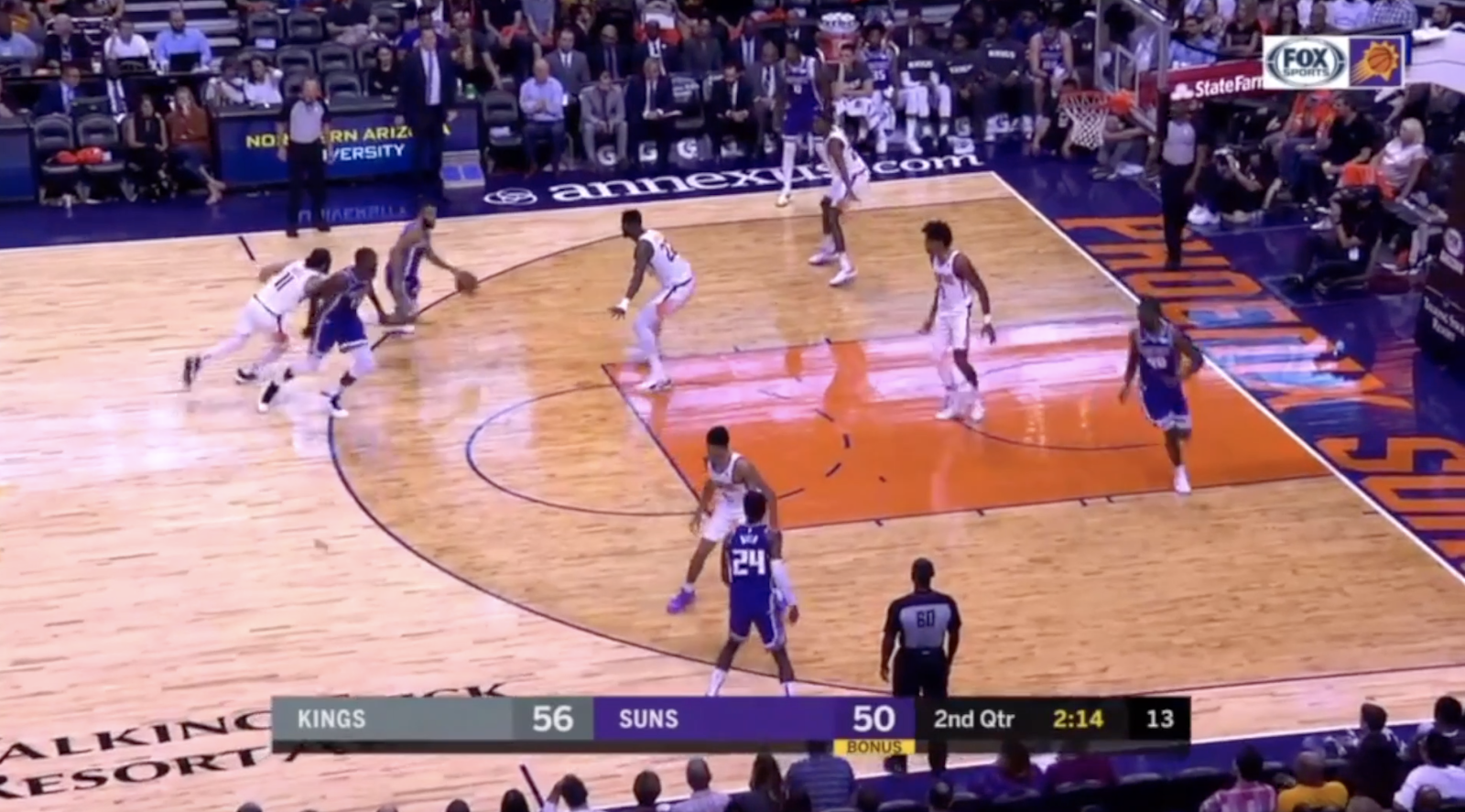With the Phoenix Suns joining the NBA bubble as one of 22 teams returning to play later this month, 2018 No. 1 pick Deandre Ayton has the platform to show a national audience that he's evolving into a two-way center and one of the league's most promising young bigs.
A 25-game suspension for a positive diuretic test delayed Ayton's breakout sophomore season, but during the 30 games in which Ayton did take the floor, his defensive progress was a bright spot, both statistically and on tape, especially when you consider where he was as a rookie.
"Rookie season was me ... I wouldn't say I was playing through the motions, but I think I was getting too comfortable, a little too comfortable," Ayton said. "This year, going through all these obstacles and me basically facing my career in front of my eyes, I just really got humbled this year."
Ayton's second-year leap is not only a huge development for Phoenix's future but also reflects how the value of the NBA center position is evolving. Here's a look at how Ayton has taken a step forward and what that could mean for future lottery picks finding their way.
Ayton recalled his welcome-to-the-NBA moment. In the second game of his career, he was tasked with checking wildly skilled Denver Nuggets center Nikola Jokic.
Jokic went for 35 points, 11 rebounds and 11 assists in a 28-point rout of the Suns. In 23 minutes, Ayton finished with just five points and eight boards. After a late-game and-1 that resulted in Ayton's fifth foul, Jokic turned to Phoenix's prized rookie and yelled, "You can't guard me."
"Yeah, it scarred me in a way," said Ayton, who called Jokic a superstar and now looks forward to every one of their matchups. "I was like, 'OK, he's in the West, huh.' I said, 'I got something for this. He's going to see me for the rest of his career.'"
Despite posting impressive box score stats for his age, Ayton had his struggles on defense during his rookie season. While fellow draftees Luka Doncic and Trae Young have garnered well-deserved fame for their offensive production and "wow" moments, Ayton is coming into his own as a defensive presence and switch option -- on top of his impressive scoring prowess.
Almost 16 months after Jokic put him through the spin cycle, Ayton got his revenge in February, showcasing his defensive improvement in the process. He helped limit Jokic while exploding for 28 points and 19 rebounds.
"He's a monster down there," Jokic told AZ Central after the game. "He's a big guy, he knows how to use his body. He just needs a little bit more experience and he's going to be great. He's going to be a really, really great player."
After analyzing Ayton's pick-and-roll defense, rim protection and defensive rebounding as a rookie, I watched every Suns defensive possession when Ayton was on the floor so far this season. There were fewer ball-screen miscues, better verticality technique and more nuance in baiting offensive players into mistakes. Ayton is still a work in progress, which is the case for most 21-year-old bigs. He'll miss occasional boxouts, forget to help on a back screen or get caught ball-watching at times. But he's developing into a defensive contributor.
According to Second Spectrum tracking data, on drives when Ayton is the help defender, the Suns allow 0.85 points per chance. That's a better figure than Rudy Gobert with the Utah Jazz. Ayton allowed 0.975 points per chance in such situations as a rookie. When he's the closest defender on shots, he ranks fifth in the NBA in effective field goal percentage allowed -- behind only Giannis Antetokounmpo, Gobert, Anthony Davis and DeAndre Jordan. He has upped his block rate from 2.6% as a rookie to 4.5% as a sophomore. And he's defending the seventh-most shots per game within 10 feet of the rim, ranking eighth in the NBA in FG% allowed in those situations (min. 250 shots defended), according to NBA.com/stats.
Ayton's one-on-one defense is becoming a strength. He's stepped out and checked shot-making guards such as Trae Young and Damian Lillard for stretches. He's kept versatile forwards such as Pascal Siakam out of the paint. He's even deterred MVPs such as Giannis from Eurostepping his way to the rim for easy looks.
"Giannis, you just gotta be prepared for a train to run you over," Ayton said with a smile. "If you brace the train, if you're scared of the train, don't play."
Ayton's feel for the game on defense stands out in conversation. He'll describe Ja Morant's go-to cross-jab move and finishing package. He'll talk through the importance of keeping Doncic off the free throw line. He'll hit on tendencies for Jokic, Kristaps Porzingis, Brook Lopez, Andre Drummond, LaMarcus Aldridge and more bigs.
Although he's not immune to scheme mistakes, he has rediscovered the kind of one-on-one perimeter defense he displayed as a prep player.
"It's scary when he sits down and locks into a guy and says, 'This guy is not going to score,'" Suns assistant Mark Bryant said. "When he locks in, man, it's a beautiful thing."
Bryant said he'd like Ayton to become a Kevin Garnett/DeAndre Jordan hybrid on defense while still finding what makes him unique. Garnett's ability to step out and guard the perimeter, play with consistent intensity and communicate instruction was second to none. During Jordan's peak years, he was a feared rim protector and a back-line anchor in part due to his vocal approach.
While Ayton's foot speed was always there, he has really evolved as a help-side defender. Learning the nuances of becoming a defensive anchor has long been top priority. At Arizona, there were too many times Ayton simply didn't rotate for contests.
"That's a fact," Ayton said after being shown a missed shot-blocking opportunity against Arizona State. "That is truly a fact."
During his rookie season, too often he was hugged up against his man or was caught napping. While watching clips of the miscues from last season, Ayton acknowledged some of the low points.
"Just look at my stance," he said. "I don't even look intimidating down there. I look terrible. I would dunk on myself."
As he has gained experience and studied more tape, Ayton is evolving into a legitimate rim protector with sharper timing and quicker reactions.
"Just learning the fundamentals of how to see both sides, how to use my peripheral vision correctly, how to use the outer hand to block shots, how to wall up correctly, how to not turn in the air when you're walling up, how to anticipate it before they even think about it," Ayton said. "When I wasn't playing, I was just working on so many things I never knew of about the game and things that I could do."
Here, against the Oklahoma City Thunder and Shai Gilgeous-Alexander, he demonstrates perfect timing and verticality technique. Ayton said he has gotten stronger in his base and core while adding much more vertical power, allowing him to be a more intimidating force at the rim.

His hand activity has also improved, and he's even learning how to read the eyes of his opponent as the back-line defender, bluffing and recovering back to his own man for steals.
His evolution is just as noticeable as a pick-and-roll defender.
Last year, Ayton struggled to play the cat-and-mouse game that you see from the league's best bigs. He'd also leave the ball handler before the guard defender recovered, not always trusting his teammates.
There's still room for growth -- and the Suns ranked 29th in points allowed per chance off picks, per Second Spectrum -- but Ayton is starting to develop the veteran tricks necessary to be an elite defender out of drop coverages.
He's consistently in a much better position to play both the guard and the roller, and he's done a much better job of baiting guards into contested pull-ups or recovering back to the big.

If these flashes of defensive effectiveness become real habits, Ayton is on track to challenge for an All-Star spot in the near future. He's already an integral part of one of the NBA's most successful lineups. Among 34 five-man units to play at least 200 minutes this season, Phoenix's group of Ayton, Mikal Bridges, Kelly Oubre Jr., Devin Booker and Ricky Rubio yielded the second-best net rating in the league (20.2). The 226-minute sample is small, but it's promising.
Ayton is one of only two players in NBA history age 21 or younger to average at least 19 points, 12 rebounds and 1.5 blocks per game. The other? Shaquille O'Neal.
"He has a chance to be something special if he really puts his work in," Bryant said of Ayton.
When asked if his rookie season was a wake-up call on the defensive end, Ayton echoed a familiar sentiment among NBA bigs finding their way.
"Ain't no wake-up call; I didn't know," Ayton said. "I can sit here and watch film all day, but that experience is something else. ... I already learned my lesson, now I'm back out here. Let's go."
Breaking down Ayton's progress brings up a major question NBA teams are regularly exploring: Just how valuable are centers in today's game?
Heading into the 2020 NBA draft, there are three bigs slated to potentially land in the top five in James Wiseman, Onyeka Okongwu and Obi Toppin. Although each prospect brings something different to the table and Toppin is considered more of a 4 in traditional lineups, NBA teams will have to further explore the merits of drafting a center with a high pick, especially as production at the position becomes easier to find on cheap contracts.
Ayton's advice to Wiseman, Okongwu and Toppin as they enter the NBA?
"Do not be a one-dimensional player," Ayton said. "Really take time to not really be full of yourself, not believe in the hype, because at the end of the day, when you're on the court, that hype could be your friend or your enemy. Trust me, you don't want to look at that phone after that bad game.
"Compete every night. Somebody's going to be coming after you every night, because I'm going to be coming after you every night. ... Trust me, this league, they're trying to get rid of the big man, so we gotta show 'em what we got."
